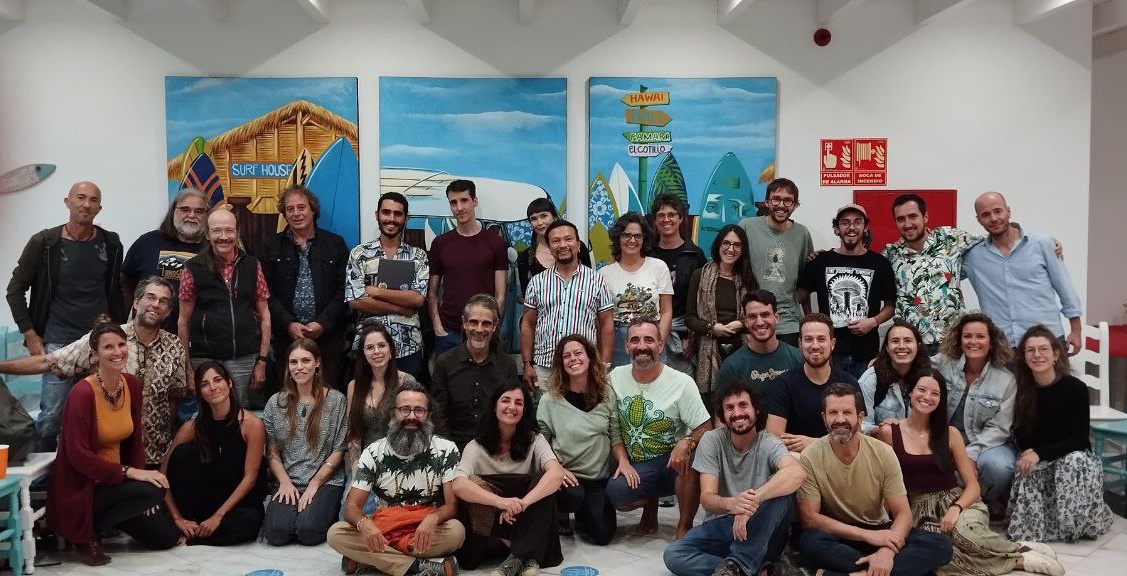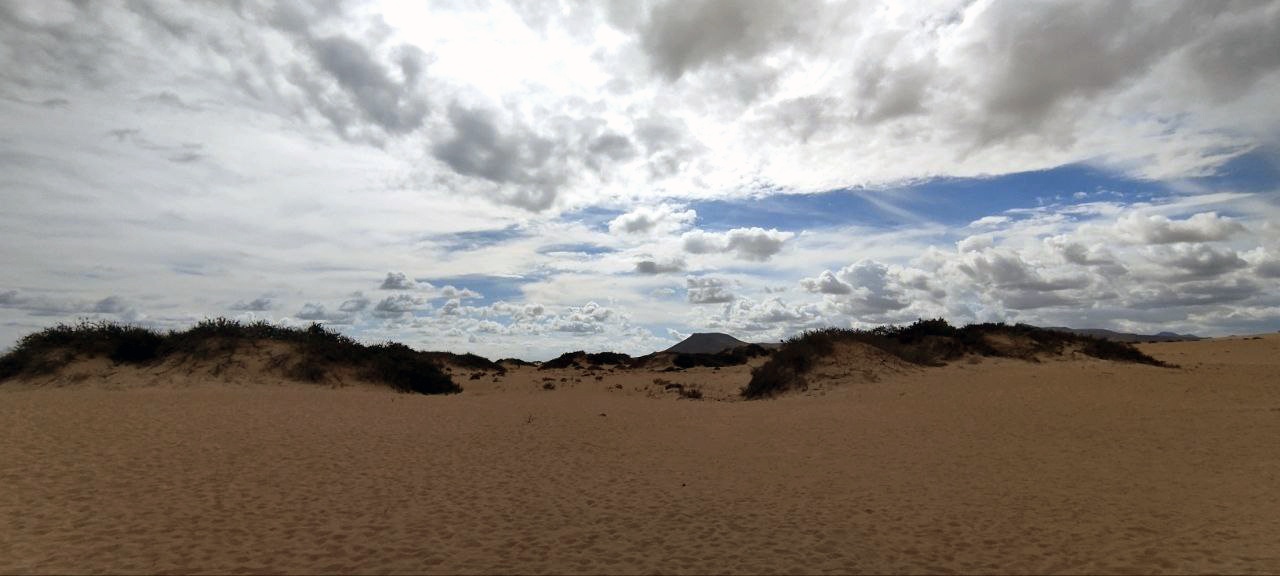ICEERS | 5 December 2023
Seventy health professionals, scientists, scholars, and aficionados of altered states of consciousness gathered in Corralejo, Fuerteventura, for the 2nd Annual Fuerteventura Psychedelic Conference. The event was organized by the Psychedelic Association Fuerteventura with the support of ICEERS.
“I’m interested in the therapeutic possibilities of psychedelics, but I don’t have sufficient training. I fear the legal consequences of recommending them at the moment,” a Canarian doctor shared during the final conference discussion. His comment encapsulates the general sentiment of the event attendees: an interest in psychedelics combined with a certain insecurity stemming from their legal status in Spain.
How Psychedelics Can Help Us Confront Death
Dr. Débora González, a professor at Isabel I University and a research associate at ICEERS, discussed her investigation on ayahuasca to treat and prevent prolonged grief during her conference presentation. According to Dr. González, “In the case of trauma, it is important to confront it before it becomes blocked. When trauma is present, ayahuasca can easily take us there. Ayahuasca helps the grieving person to not relive the loss from their own perspective, but rather see it from the viewpoint of the deceased. The grieving person shifts from the center of the tragedy and can then find more compassion.”
"With ayahuasca, the mourner does not relive the loss from their own experience but from the experience of the deceased," comments Dr. Débora González, a researcher associated with ICEERS, at the #ConferenciaPsicodélica2023. pic.twitter.com/Akct9kh12Z
— ICEERS (@NGO_ICEERS) November 25, 2023
The Culture of Trauma
José Carlos Bouso, the Scientific Director of ICEERS, opened the day questioning the “trauma culture” that permeates some aspects of psychedelic-assisted therapy. Trauma culture is based on the popular idea that one must look to repressed events of the past to solve current problems. Known in the academic world as “the trauma wars,” they were once thought to be quelled decades ago. It seems that they are resurfacing again in certain sectors of psychedelic culture. Dr. Bouso warned of the lack of evidence for this approach as well as the risks to patients this perspective can encourage.
“It is very tempting to look for the roots of trauma in the origin, longing for the lost paradise of Genesis, the origin myth of our culture. But… we must work on what is happening now and with what we remember,” said Dr. Bouso.
In conclusion, he called for the “decolonization of trauma”, highlighting the differences in the treatment of trauma between cultures, “The treatment of trauma has an individual approach in [Global North] cultures. However, in animist cultures, trauma was dealt with in community ceremonies.”
"The culture of trauma trivializes the traumatic experience. We are equating people who have suffered actual abuse with those who have gone through normal experiences." — José Carlos Bouso, Scientific Director of ICEERS, at the #ConferenciaPsicodélica2023. pic.twitter.com/mRblQtqhr5
— ICEERS (@NGO_ICEERS) November 25, 2023
Psychedelics and the Buddhist Tradition
Elías Capriles, a Venezuelan expert in philosophy, psychology, Buddhism, Dzogchen, and psychedelics, took the stage to discuss the intersection between psychedelics and meditative states. Capriles has spent decades researching and experimenting with this topic.
“In Dzogchen teachings, there are practices in a dark room where the brain starts continuously secreting DMT. It can be a very prolonged experience, and conflict arises every time you feel separated from the visions,” Capriles stated. He referred to his teacher’s teacher who is said to have remained in darkness for 55 out of the 110 years she was alive. “They say she could see in the dark as if it was the day.”
"Many people who entered a hellish trip, what is called a 'bad trip,' thought that this suffering itself was a purification, as if there was a release at the apex of suffering." Elías Capriles (@CaprilesEli), Venezuelan author specializing in Buddhism, on Dzogchen & psychedelics. pic.twitter.com/489tYIWoA3
— ICEERS (@NGO_ICEERS) November 25, 2023
Psychedelics and Women’s Health
Catriona McAlister is a psychologist and researcher on master plants for women’s health. Catriona shared some of the results of her research on the potential benefits and harms of ayahuasca during the transition into perimenopause. Her research was based on interviews with ayahuasca facilitators and women attending ceremonies.
Her research suggested that ayahuasca allows for a “radical acceptance of perimenopausal symptoms,” including “improvements in emotional aspects and potential for physical healing. Reduced hot flashes, improved menstruation, better dreams, reduced migraines, and increased energy.” However, McAlister pointed out that the results are preliminary. Further studies are needed to explore the effects of ayahuasca and other master plants not only on menopause and the menstrual cycle but also on women’s health in general, which is a neglected field in psychedelic research.
"Imagine a future where psychedelics can be replaced by hormone therapy in women with perimenopause." — Cat McAlister, psychologist specializing in perimenopause, holistic health, pleasure, altered states of consciousness, and psychedelic therapies. #ConferenciaPsicodélica2023 pic.twitter.com/hx1QzJuXIE
— ICEERS (@NGO_ICEERS) November 25, 2023
The Importance of Set & Setting
Jaime Rojas, a researcher from the Psychedelic Scientific Association based in Las Palmas de Gran Canaria, presented the results of his investigation on the influence of set and setting on the psychedelic experience. This topic is rather unexplored in the field given its vital importance for the psychedelic experience. The results were reported based on the responses of 1,022 individuals who had psychedelic experiences. They were asked about the influence that location, who they were with, or motivation had on the experience. “Nature is the only setting for consumption that predicts a clear and consistent pattern of therapeutic outcomes; less neuroticism, increased life satisfaction, reduced paranoid ideation, anxiety, hostility, and depression,” Rojas explained.
«Motivaciones de crecimiento, entornos naturales y presencia de personas significativas predijeron resultados terapéuticos positivos en el uso de psicodélicos». Jaime Rojas, de la Asociación Científica Psicodélica de Gran Canaria, en la #ConferenciaPsicodélica2023. pic.twitter.com/LmPcVs56Xr
— ICEERS noticias (@NGO_ICEERS_ESP) November 25, 2023
Sleep, Psychedelics, and Cognition
Tomáš Páleníček, from the National Institute of Mental Health in the Czech Republic, dedicated his presentation to the impact of psilocybin on sleep, cognition, and well-being. “What happens to sleep the night after consuming psilocybin?” the Czech researcher asked. “Almost all patients with depression symptoms have sleep disorders. Neuroplasticity is low for those with depression. We know that psychedelics can promote neuroplasticity, while psilocybin can increase memory consolidation, which is linked to REM sleep.”
“For psychedelics to work, we need to detach ourselves from the surrounding reality. The outgoing network that tells us we need to focus on something is turned off." Tomáš Páleníček, from National Institute of Mental Health in Czech Republic. #ConferenciaPsicodélica2023 pic.twitter.com/B8SknGgp2U
— ICEERS (@NGO_ICEERS) November 25, 2023
Can an App Facilitate Integration?
David Londoño, a psychologist, psychotherapist, and Coordinator of the ICEERS Support Center, closed the conference by addressing a controversial and timely topic. Given the rise of artificial intelligence, can an app facilitate integration? The answer to this rhetorical question is definitely a no, despite the attempts to automate the interaction between patient and therapist after a psychedelic experience.
“Studies indicate that the quality of the patient/therapist bond is the most important factor in producing significant changes. Modern psychopathology revolves around emptiness, loneliness, or isolation. The WHO has declared loneliness a public health issue. The figures are chilling” David shared. This situation has on one hand, the technological solutionism proposed by some people in the psychedelic renaissance. There is also the alternative, which is to restore human connection as the cornerstone of social well-being, as Londoño advocates for.
"Not only do we need to integrate, but also ask ourselves how to do it in a more profound and meaningful way to reweave connections with the community." ICEERS' psychologist David Londoño wonders if an app can be used for integrating psychedelics. #ConferenciaPsicodélica2023 pic.twitter.com/GE2ZxYIXsa
— ICEERS (@NGO_ICEERS) November 25, 2023
Visit the Fuerteventura Psychedelic Conference website for more information on the past and future editions of this annual event on the oldest island of the Canary Archipelago.

Photos by ICEERS.
Categories:
EVENTS
, NEWS
Tags:
psychiatry
, psychedelics
, conference
, mental health
, set & setting
, women
, Fuerteventura

